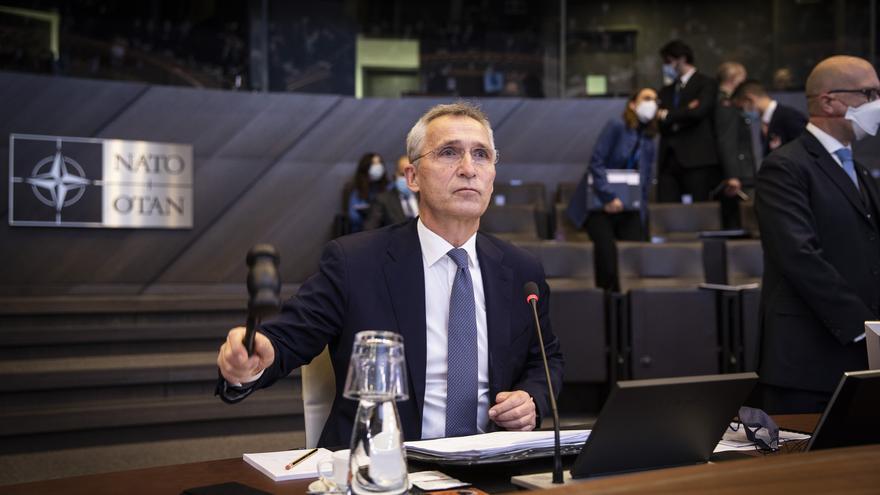Two and a half years ago, since July 2019, there was no council meeting OTAN–Russia, an instance of dialogue between the allied countries and Moscow dedicated to security and political issues. Twenty-four hours after the first bilateral talks between Washington and Moscow in Geneva, the Atlantic Alliance and the Kremlin have retaken this diplomatic channel with a “useful”, “frank” and “open” meeting, according to Secretary General Jens Stoltenberg, aimed at lower tension caused by the deployment of 100,000 soldiers in the russian border with Ukraine and the fear of an eventual Russian invasion, which has ended without concrete progress.
“It has not been an easy discussion but that is precisely why it was so important. We have had a serious discussion and direct exchange on the situation in Ukraine and the implications for European security. There are significant differences between NATO allies and Russia and they are not easy to overcome but it’s a positive sign that all the allies of NATO and Russia have sat around the same table and have addressed substantial issues ”, he summarized after the four hours of meeting, at the level of ambassadors, in which the Russian deputy foreign minister also participated, Alexander Grushko, and the US Undersecretary of State, Wendy Sherman.
During the meeting, Moscow has again demanded that no country of the former Soviet bloc, such as Ukraine or Georgia, join NATO and that the allies withdraw the troops deployed in the eastern countries. The Atlantic Alliance for its part has reiterated that it is unacceptable for the Kremlin to decide who enters or not in the Brussels-based organization and has made it clear that it does not give up protecting the eastern flank. It’s more, has advised that additional troops could be deployed. “If Russia uses force again against Ukraine and continues to invade the country, we will have to seriously study the need to increase our presence in the eastern part of the Alliance,” Stoltenberg warned, also pointing to economic and political consequences.
Conflict risk
Stoltenberg has recognized that an armed conflict in Europe is a “real risk” and has explained that NATO will do everything possible to avoid this scenario. “That is why this meeting and others this week are so important,” he reiterated, stressing that the way out of this crisis is that Russia lowers the tension in Ukraine. “If Russia wants to be successful through diplomacy, it must lower the tension,” Sherman responded at a press conference. “He has to make a tough choice: de-escalation and diplomacy or confrontation and consequences,” he warned.
Despite the clash of positions, the allied countries have shown themselves willing to continue scheduling meetings with Russia to try to resolve issues that concern them, such as increasing military exercises, avoiding dangerous military incidents, reduce threats in cyberspace and space or gun control. The Russian representative, according to the NATO secretary general, has responded that he is not prepared to give an answer. ” The important thing in the end is that the Russians were not prepared to commit to the series of discussions raised by the secretary general but they have not rejected them either, ”explained Sherman, who has warned that if Russia withdraws from the dialogue, it will be clear that it will never do so. They took it seriously and has once again closed ranks with the EU.
OSCE meeting
This Wednesday’s appointment will be followed this Thursday by a1st meeting of the permanent council of the Organization for Security and Cooperation in Europe, headed by the German diplomat and former secretary general of the EU diplomatic service, Helga Schmid. It is a multilateral forum in which Russia, the United States, the EU and Ukraine participate and one of the few institutions in which all actors sit.
The NATO-Russia Council began meeting in 2002 as a forum for consultations on security and cooperation issues. The Russo-Georgian War of 2008, following the declaration of independence of the profuse regions of South Ossetia and Abkhazia, led to suspension of formal meetings until spring 2009 and since April 2014, following the illegal annexation of the Crimean peninsula, the allies suspended all practical and military cooperation with Moscow and were militarily reinforced on the eastern flank.
Relationships worsened further after the nerve gas attack in Salisbury, which ended with NATO expelling Russian diplomats, although NATO decided to keep the Council operational, which met ten times between 2016 and 2019. Since February 2020, Vladimir Putin’s government had repeatedly declined meeting offers.
www.informacion.es
Eddie is an Australian news reporter with over 9 years in the industry and has published on Forbes and tech crunch.
